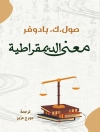Empires have been the commonest form of political organization for most of recorded history. How should we best understand them? What are their principles and how do they differ from other political forms, such as the nation-state? What sort of relations between rulers and ruled do they express? Do they, as many have held, follow a particular course of “rise, decline, and fall”? How and why do empires end, and with what consequences? Is the era of empire over?
This book explores these questions through a fascinating analysis of the major empires of world history and the present. It pays attention not just to the modern overseas empires of the Europeans, but also to the ancient empires of the Middle East and Mediterranean, the Islamic empires of the Arabs, Mughals, and Ottomans, and the two-thousand-year Chinese Empire. As Kumar shows, understanding empires helps us understand better the politics of our own times.
قائمة المحتويات
Preface
Chapter One Empires in Time and Space
Chapter Two Traditions of Empire, East and West
Chapter Three Rulers and Ruled
Chapter Four Empires, Nations, and Nation-States
Chapter Five Decline and Fall
Chapter Six Empire after Empire
Notes
References
Index
عن المؤلف
Krishan Kumar is William R. Kenan, Jr. Professor of Sociology at the University of Virginia.












